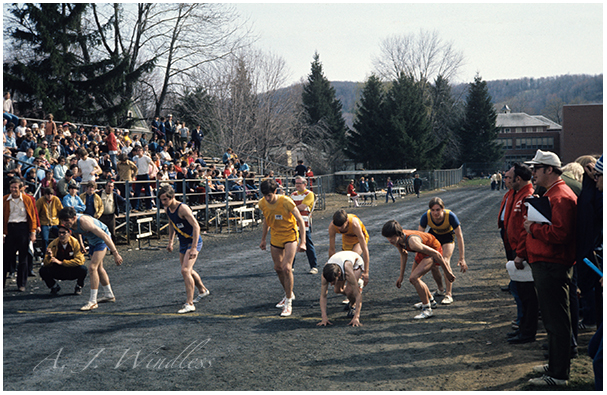 |
 |
| The Power of the Truth |
|
I still had just a trace of soreness in my throat, but my
brother said that was probably just scar tissue and that I was
probably over my bronchitis by now, so I decided in more ways
than one to make up for lost time. We had a meet with Eisenhower
coming up on Friday and it was customary that two days before a
meet we would only work out moderately and that the day before a meet we would
go really light. I didn't think Eisenhower had anyone that could beat me, so I
took a page out of Jim Ryun's book and decided to work out hard the day before
the meet, clocking myself 20 times in the quarter mile. I was right, the next
day I still won the mile easily, again with a time of 4:49. I was wrong about the
half mile, though, not having enough steam to keep from getting nipped at the
tape and only finishing second. But the real effects would be felt when I arrived home that night. My bronchitis came thundering back and I coughed really hard nonstop all night long. My mother was a nurse, and all season long she had been getting penicilin out of the hospital to give me, so once again she gave me a shot that night. I don't think I was born with an allergy to penicillin, otherwise symptoms would have appeared long before this, but a whole season of getting shots and taking capsules built up an allergic reaction, and that night I broke out into hives. All over my body my skin bubbled up in large patches. I was sick in bed all weekend. The county meet would be held on Tuesday, so Monday I went and talked to the coach. With all the coughing I had done over the weekend, I was concerned that he had me slated for the 2-mile relay which was just minutes before the mile run. Our relay team was not very fast and had no chance of scoring any points in the county meet, so I wanted him to take me out of it. As I explained to him, in my condition, running the relay, and then a few minutes later running the mile, would make it difficult for me to win the mile, which might take enough out of me to give Joe Sain the edge in the 800. He stubbornly refused, but finally made a very small concession, I would run the second leg rather than the last leg, which would give me an extra 4 minutes of rest. The next day as I grabbed the baton from our first runner, the lead runner was already 10 yards ahead of me. By the end of the first lap I caught up to, but was unable to pass him. Try as I may, I could only run side by side with him the entire lap. Our third and fourth guys didn't to do any better, and as predicted our relay team failed to score any points. But the real story of the day was that my illness would effect me much more than I had anticipated. I turned in a demoralizing performance in the mile, placing only 7th with a time of 5:12, not only my first loss of the season, but an embarrassing seven places back, and a full 32 seconds slower than what I had run just a week earlier. I never did run against Joe Sain that day, and I never did stick around to see how the meet turned out. That defeat punched me in the face so hard that I immediately walked off the track, back to the school, and threw all of my equipment in front of the coach's door as my way of saying, "I quit." It's true, I was angry at him for not removing me from a relay team that had no chance of winning. I felt that perhaps if I had not tried so hard to pass that guy in the 2-mile relay maybe I would have been strong enough to win the mile. But more than anything I was tired of fighting the bronchitis. It had dogged me the entire season, making it difficult for me to get into shape, and every time I thought I was healthy it would come storming back, worse than before. It was already clear that I would not set the school record in the mile, and I certainly wouldn't be going to the state championship. I was devastated. Information, possession of the correct facts, is the difference between success and failure. Without knowing the truth, if I could relive that season a hundred times, it probably would have turned out exactly the same every time. I ran cross country every fall, I ran track every spring, and subsequently I struggled with colds every fall and every spring. I assumed I was working out so hard that my body became excessively worn down and therefore I was more suspectible to colds. Noticing that some of the other students had allergies, I once asked my mother if I had any allergies. We didn't have the internet back in those days, and people weren't as well informed and as knowlegable as they are today. My mother was a nurse, so when she told me I didn't have any allergies I believed her. Sixteen years later when I got my Alaskan Malamute I began having allergy symptoms. I wanted to know if I was allergic to my dog so I had allergy tests performed. They tested me for 210 possible afflictions. We had no idea what I might be allergic to, so only 10 of the irritants were pollens, but I was highly allergic to five of those ten. Now it all made sense. I coughed every fall and every spring, not because of colds, but because of allergies. Apparently there was a certain amount of pollen that my body could tolerate without any negative symptoms, but the more I ran, the more pollens I sucked deeply into my system. If I took a few weeks off the symptoms cleared up. But it was inevitable that my senior year, with all my goals at hand, I was going to work harder than any previous years and that therefore the coughing would be a serious problem. It was also inevitable that as soon as I seemed to recover, determined to make up for lost time, I would work even harder than ever before, which would completely devastate my lungs. Without knowing that I had allergies, I could have relived my senior year a hundred times and it would have come out exactly the same each time. There are steroid shots and other forms of allergy treament, but for me and my condition, if I had it to do over again knowing that I had allergies, I would simply have worked out hard up until the first sign of a cough, and then backed off a little. Perhaps I would not have been able to run the quarter mile 20 times in one workout. Would I have been able to set the school record if had I backed off? That's hard say, but without the recurring cough I certainly would have had a lot more consistency. The coach at the University of Utah once told me that if I ran more than 10 quarter miles in one workout I was "overtraining". I'm still not sure I believe him. His teams never won a conference championship, while Jim Ryun, who frequently ran 32 quarter miles in one workout set the world record at age 19. But if the coach is right, it's possible that with lighter workouts I could have run faster as well. (Photo above: That's me on the front line in the yellow uniform. Despite the fact that I see four different colors of uniforms in this photo, I believe this is a dual meet with Emporium.) |